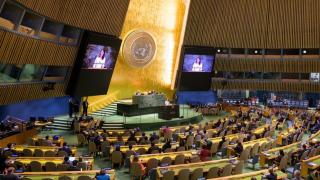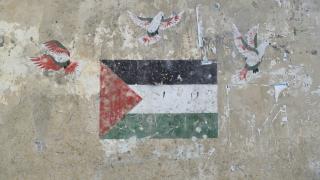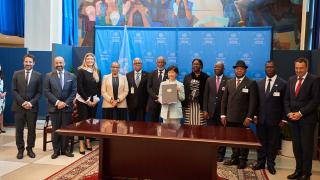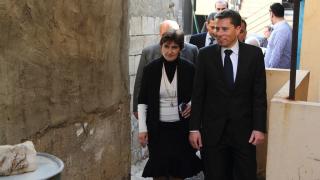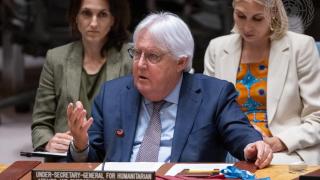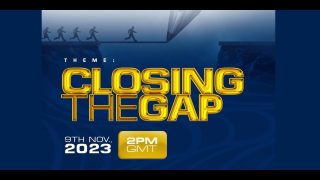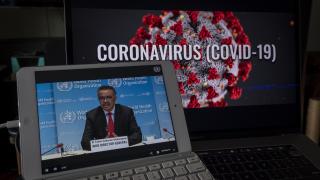
Part of our regular series of background briefings on the UN in the news.
The World Health Organisation is an international institution tasked with improving the health of the people of our planet. It has its own separate charter and system of governance and funding from the United Nations, but is part of the wider UN family, being one of the “specialised agencies” brought “into relationship” with the UN under article 57 of the UN's charter.
Given the current pandemic its work has taken on a renewed importance and has attracted additional public interest - not to mention the occasional piece of misinformation. The organisation has further been in the news as a consequence of the US President's persistent criticisms and actions against it.
UNA-UK believes in the need for international cooperation in the face of shared problems, such as diseases that cross borders with ease. We therefore strongly support the purpose and principles of the WHO and, to that end, are pleased to provide the following factual briefing on the work of the WHO.
What is The World Health Organisation?
The World Health Organisation is one of the United Nations specialised agencies - an autonomous agency with its own membership, but co-ordinated through the UN Economic and Social Council (ECOSOC). Founded in 1948, the organisation has its own constitution that defines its principles, governing structure and mandate for its work to ensure that people are able to attain the “highest possible level of health”. It is headquartered in Geneva and has 150 field offices worldwide from which it carries out a broad spectrum of work.
The organisation’s key role is to direct and coordinate international health within the UN system. Under its mandate WHO advocates for universal healthcare, coordinates responses to health emergencies, monitors public health risks, and supports the administration of vaccines worldwide. Their main areas of work are:
- Health systems
- Health through the life-course
- Noncommunicable and communicable diseases
- Preparedness, surveillance and response
- Corporate services
How is it funded?
Funding has two channels: assessed contributions and core voluntary contributions.
Assessed contributions are dues states pay as part of their membership of the Organisation. The amount each country pays is calculated based on its wealth and population. You can read more details about this here.
These assessed contributions make up less than a quarter of the Organisation’s financing but remain integral to financing WHO’s work as not only do they allow a regular source of funding, but also enable resources to be aligned to the Programme Budget, rather than being tied to specific projects selected by donors.
You can see a list of assessed contributions here.
The rest of the WHO’s funding comes from voluntary payments from member countries, foundations, and the private sector and are generally provided for specific programmes, such as polio vaccination, Ebola control, or COVID-19.
Table of top 20 contributors to WHO Programme Budget:
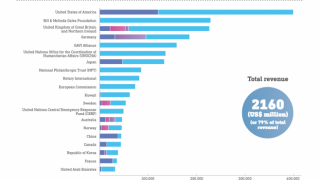
Image: World Health Organization
How is it governed?
Governance of the Organisation is administered by the World Health Assembly, comprising 194 member states - the supreme decision-making body. They in turn elect 34 "technically qualified" individuals to the Executive Board, which gives effect to the decisions and policies of the Health Assembly.
Currently the members of the WHA include all of the member states of the United Nations except for Liechtenstein, plus the Cook Islands and Niue - non-UN member states where the UN exceptionally recognises a "full treaty making capacity". All members of the United Nations are eligible for membership of the WHO. Countries such as Taiwan, the Sahrawi Arab Democratic Republic, Kosovo or Somaliland which are not members of the UN, would first need to be accepted as members of the UN if they wished to join the WHO - and could be blocked from doing so by states in the UN General Assembly.
The Organization is headed by the Director-General, who is appointed by the Health Assembly on the nomination of the Executive Board. Dr Tedros Adhanom Ghebreyesus is the current Director-General of WHO, elected by a vote of Member States at the World Health Assembly on 23 May 2017. The Director-General is WHO's chief technical and administrative officer and oversees the policy for the Organization's international health work. Dr Tedros took office for a five-year term on 1 July 2017.
Why is the WHO important?
The WHO continues to strive for universal health coverage so that everyone, everywhere can access the health services they need, when and where they need them, without financial hardship.
The Organisation has been integral to public health achievements such as the eradication of smallpox - the only time an infectious disease has been eliminated - in 1980 when it led a global immunisation campaign. Through the Expanded programme on immunisation, in partnership with UNICEF, Gavi the Vaccine Alliance, and others, WHO continues to bring vaccines to millions of children. As such, they have played a key role in the near-eradication of polio and the development of a vaccine for Ebola.
WHO also acts as an essential international coordinator in response to global health crises. The Organisation supports countries as they coordinate the efforts of governments and partners – including funds and foundations, civil society organizations and the private sector.
More specifically, WHO’s Contingency Fund for Emergencies helps WHO to respond rapidly to disease outbreaks, humanitarian crises and natural disasters. For example, funds were rapidly made available to help thousands of people in Cox’s Bazar, Bangladesh, to prevent the spread of cholera, measles and diphtheria.
How has the WHO responded to Covid-19?
In April 2020 WHO released an update to their Covid-19 response strategy. According to this strategy, the key elements of controlling and slowing the transmission of Covid-19 are:
• Mobilize all sectors and communities to ensure that every sector of government and society takes ownership of and participates in the response and in preventing cases through hand hygiene, respiratory etiquette and individual-level physical distancing.
• Control sporadic cases and clusters and prevent community transmission by rapidly finding and isolating all cases, providing them with appropriate care, and tracing, quarantining, and supporting all contacts.
• Suppress community transmission through context-appropriate infection prevention and control measures, population level physical distancing measures, and appropriate and proportionate restrictions on non-essential domestic and international travel.
• Reduce mortality by providing appropriate clinical care for those affected by COVID‑19, ensuring the continuity of essential health and social services, and protecting frontline workers and vulnerable populations.
• Develop safe and effective vaccines and therapeutics that can be delivered at scale and that are accessible based on need.
The Organisation estimates that $1.7 billion will be required in order to continue the international response to Covid-19 until December 2020.
These funds are essential for WHO to support governments prepare and respond to coronavirus outbreaks. As of 29 May the WHO Covid-19 appeal has received a total of $667.8 million and pledges amounting to $225.9 million - combining to over 50% of the total required.
Why are relations with the USA currently tense?
President Trump stated on the 29 May stated that he intends to halt US membership of the WHO. This statement fits within a pattern of similar announcements whereby the US President attempts to unilaterally recuse the US from established international treaty agreements. In simple terms, the President’s statement has no immediate legal impact. As set out in this blog from Just Security, for the US to withdraw from WHO is not a simple process. Not only do the terms of US membership in American law mean that strict conditions regarding notice and dues need to be met, but the President will also need congressional approval for any such decision.
This development is the latest incident in a months long, sustained attempt to undermine the Organisation by the US president. He has repeatedly criticised the WHO handling of the pandemic, as well as levelling accusations of corruption and pro-China bias. On 19 April, President Trump announced a 30-day pause in funding to the WHO. This largely symbolic gesture sat within a wider pattern of the US paying its mandatory contributions to the WHO late, and reducing or deferring its voluntary contributions. As the US is the WHO’s largest single funder, the overall consequence of this action is that the US is now in considerable arrears, and that WHO has an even more considerable funding shortfall. Nevertheless, the WHO should not suffer budgetary consequences in the short term; a spokesperson for the Organisation said in April that the level of outstanding payments was "not unusual".
At present these developments will not have direct practical consequences for WHO, however they send a worrying message that undermines the multilateral effort being coordinated by the Organisation in the face of the devastating impact of the coronavirus.
Now, more than ever, international cooperation is needed in order to face the catastrophic risk posed by Covid-19. While there will be time and place to assess how and what our international organisations and communities could do better in future in order to mitigate and face crises such as this, it is not possible to conduct such an appraisal while the crisis is still ongoing. The WHO delivers and coordinates life-saving emergency response to outbreaks, whilst also maintaining the vital global health support needed in order to continue vaccinations and many public health programmes internationally - we therefore hope and trust that the UK, alongside the wider international community, will continue to give the Organisation our full support.
Photo: WHO Director-General Holds Virtual Briefing on COVID-19 Pandemic. c. UN Photo/Loey Felipe

